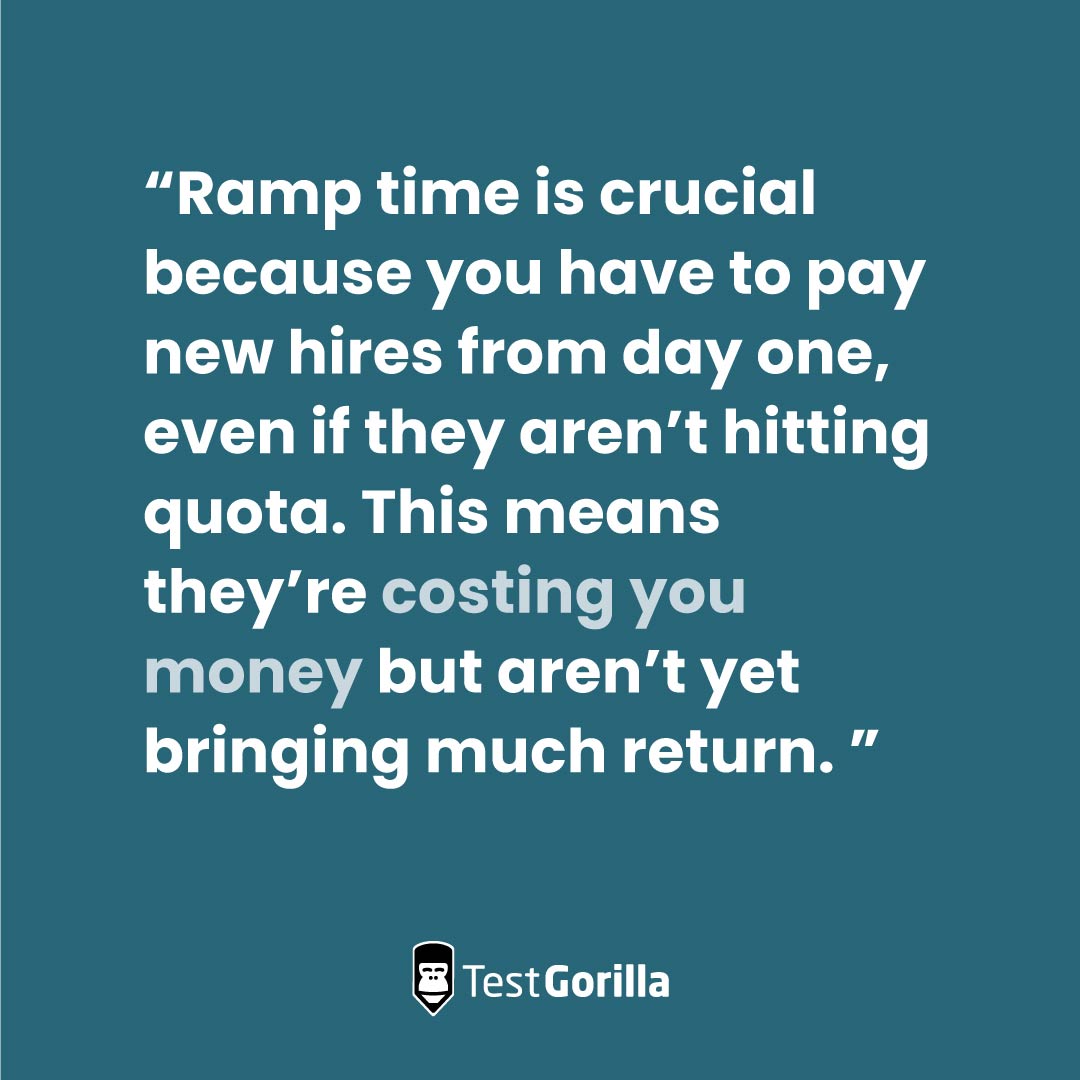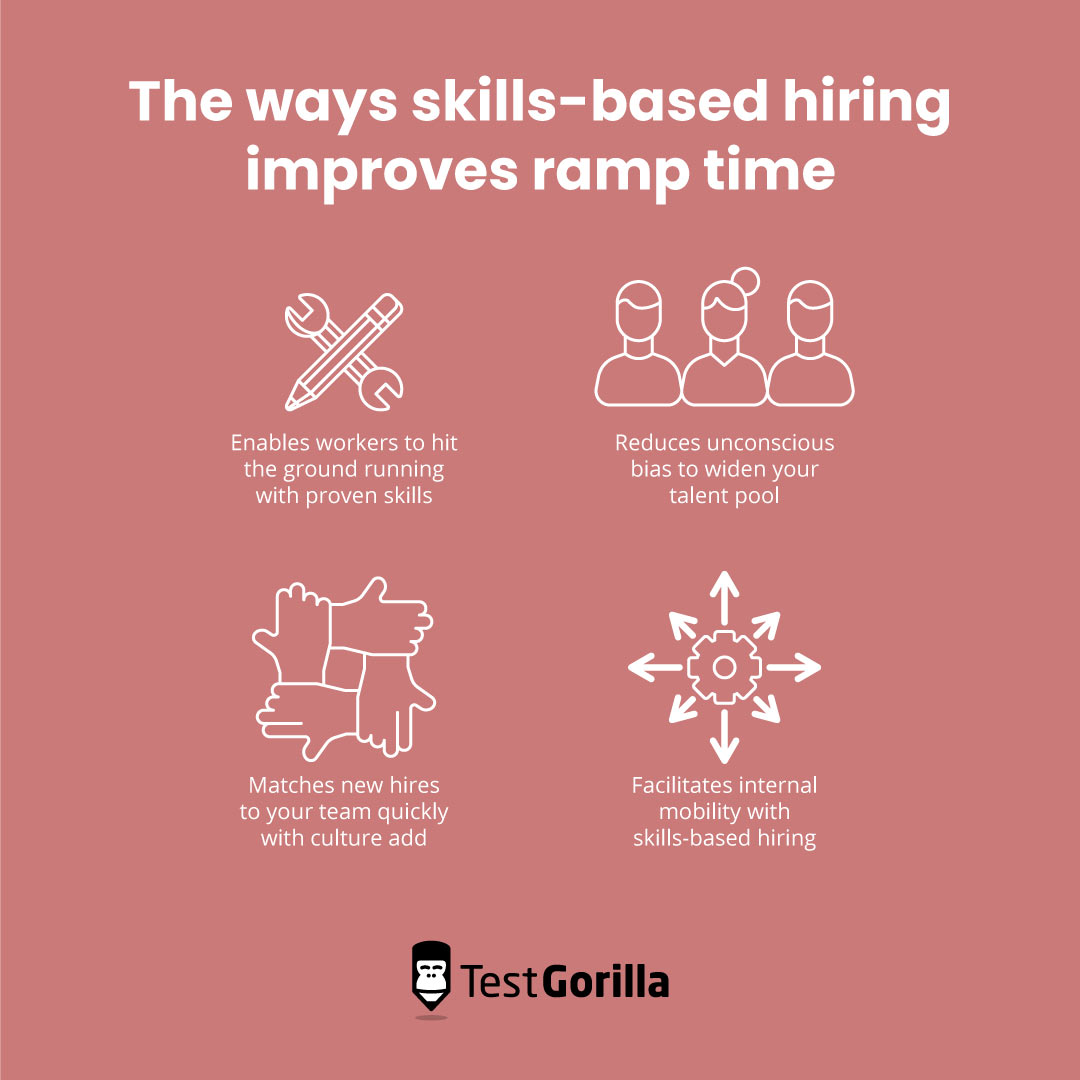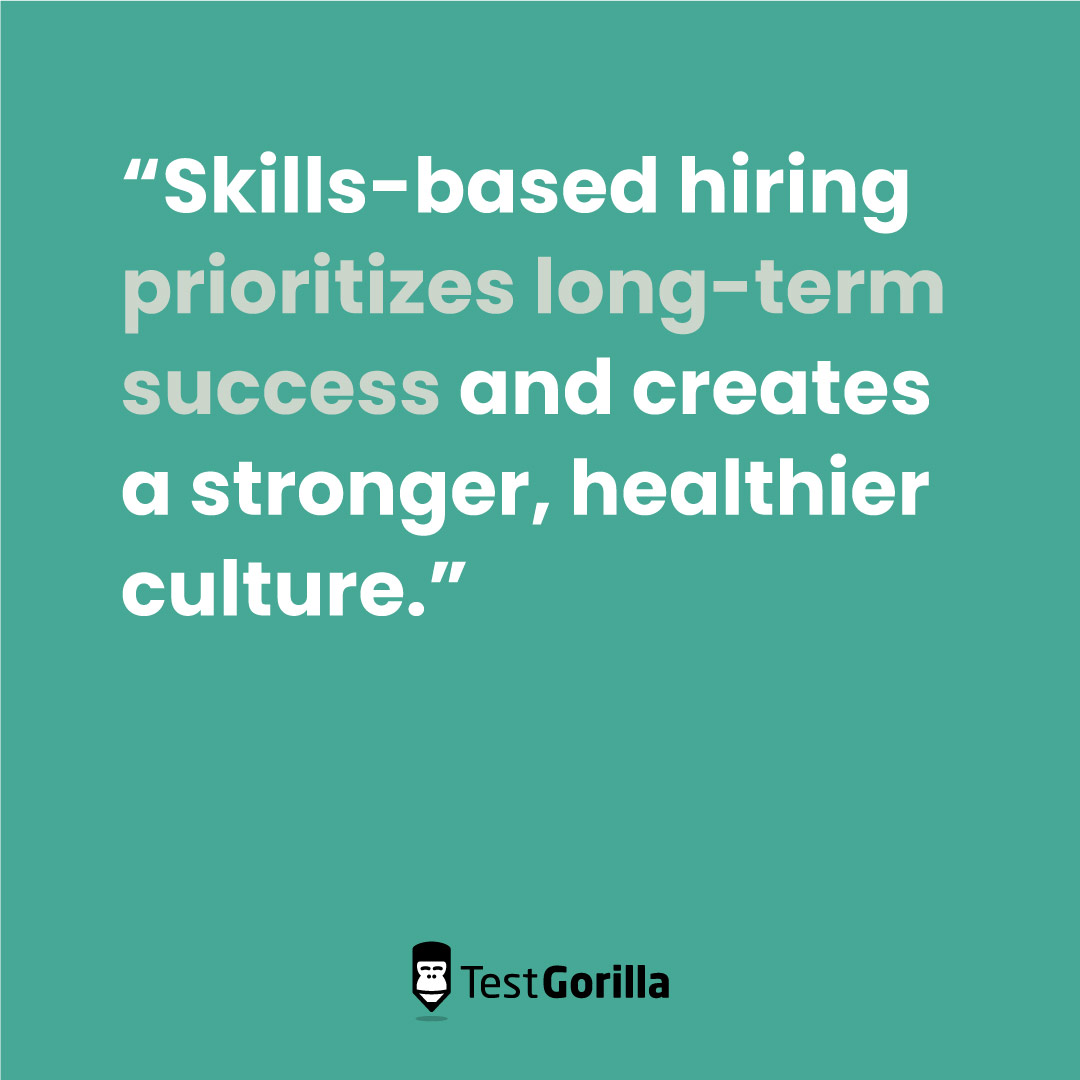How skills-based hiring can reduce ramp time
Skills-based hiring is taking the world by storm: 81% of businesses use skills-based hiring processes in 2024. Increasingly more teams are using this recruitment method to find new hires. But the hiring process is, of course, only the beginning of the story.
So the big question is: How does skills-based hiring affect ramp time?
“Ramp time” is that crucial time between an employee’s first day and the day they become fully productive.
In this period, these employees are costing you money and aren’t bringing in full quota. They’re learning and getting used to their new role.
An ideal hiring process would have highly qualified candidates ready to hit the ground running, lowering your average ramp time.
Skills-based hiring evaluates a candidate’s skills objectively and ensures you’re getting the best person for the role so they can swiftly reach full productivity.
At the same time, you might just find that skills-based hiring improves your company culture. It can help you toss away that revolving door environment, leading to happy, long-term employees and more productive teams.
In this article, we discuss how skills-based hiring improves ramp time and how a switch to skills-based hiring leads to longer term relationships and a healthier company culture.
What is ramp time and why is it important?
Ramp time is the period of time between when a candidate is hired and when they’re trained and fully productive in their role.
This term is most often used in sales. Since sales is rather black-and-white in determining effectiveness – you either make the sale or you don’t – it’s an industry where ramp time is especially important.
Ramp time is crucial because you have to pay new hires from day one, even if they aren’t hitting quota. This means they’re costing you money but aren’t yet bringing much return. Sales is one industry where ramp time is particularly important:
The Bridge Group estimates that the average ramp time for sales development representatives is 3.1 months and 4.9 months for account executives.
However, the RAIN group says it takes three months for basic productivity and that a sales professional needs a full nine months for competency.
According to Glassdoor, the average salary of a sales development representative is $69,498, so the first nine months cost the company about $52,123 if no sales are being made.
It’s already frustrating to pay a new hire and receive sluggish sales, but if that worker quits before they’re fully ramped up, you lose a lot of time and money.
Ramp time and retention are critically important and every manager and human resources professional is looking for a way to improve them.
Skills-based hiring is the answer to both concerns. TestGorilla’s State of Skills-Based Hiring report found that 91.2% of organizations saw an increase in retention using skills-based hiring.
What about ramp time? Let’s dive in.
How skills-based hiring reduces ramp time
So, how does skills-based hiring reduce ramp time?
Skills-based hiring empowers you to objectively prove capability. When you know for certain that a candidate holds the right skills, they’re going to adapt and learn faster.
Let’s take a look at a quick summary of the ways skills-based hiring improves ramp time:
Enables workers to hit the ground running with proven skills
Reduces unconscious bias to widen your talent pool
Matches new hires to your team quickly with culture add
Facilitates internal mobility with skills-based hiring
1. Enables workers to hit the ground running with proven skills
Hiring managers can verify the true capability of candidates using pre-employment skills testing.
Traditional methods, like scanning hundreds of resumes, leave a lot of room for error. The effectiveness of resumes is unreliable at best, so depending on them could leave you with a candidate who isn’t suited to the role.
Skills tests let new hires prove their talent with real data.
According to our State of Skills-Based Hiring report, 92.5% of organizations saw a reduction in mis-hires due to skills-based hiring, and a further 34.7% of employers said that skills-based hiring helps them predict job success.
Let’s take a look at a sample assessment for a sales development representative, consisting of five different tests:
Outside Sales (B2B) test: Evaluates candidates’ skills in selling B2B products through transactional, outbound sales
B2B Lead Generation test: Evaluates candidates’ technical knowledge and experience in lead generation and sales development
Motivation test: Measures the extent to which your candidates’ expectations align with your job offer
Negotiation test: Assesses candidates’ ability to negotiate in a business context to achieve positive results and close favorable deals
Culture Add test: Assesses how a candidate’s values and behaviors align with your organization’s values
You can find these tests and many more in our test library.
An assessment like this helps you evaluate a candidate’s outside sales skills and negotiation ability as well as personality elements like motivation.
Pre-employment tests empower you to assess key skills so you can hire staff confidently, assured that they’ll be hitting their targets in no time.
2. Reduces unconscious bias to widen your talent pool
Skills-based hiring expands your talent pool, helping you to zero in on the right candidate for your role where traditional hiring might have never found them.
The right candidate is much more likely to have a short ramp time.
Here are a few ways skills-based hiring opens the talent pool where traditional processes don’t:
Reduces unconscious bias
Eliminates the need for resumes, work history, and degrees
Reaches unlikely candidates from nontraditional backgrounds
John Kim, a member of TestGorilla’s sales team, comes from an unlikely background.
John was trained as a software developer and never thought he was destined for sales. He describes his experience as a people person trying to fit into a software developer role.
“I look like a proper dev on paper, but I was miserable in that position.”
Skills-based hiring helped him to explore his talents and discover his true passions.
The switch from a software dev to a sales representative may seem like an odd one, but John is now a valued and successful member of the TestGorilla team. We’re lucky to have him, and it’s all thanks to skills-based hiring.
You can end up with some surprisingly talented candidates when you reduce bias and open the door to nontraditional, diverse applicants.
To read John’s whole story, check out our 10 stories that demonstrate the power of skills-based hiring.
3. Matches new hires to your team quickly with culture add
When a candidate’s values align with the company, it increases teamwork, morale, and collaboration.
“Culture add” enables new hires to quickly become a part of the team.
You’re probably wondering, what’s the difference between culture add vs culture fit?
Culture fit, although relied on for years, refers to finding a candidate that perfectly “fits into” your company.
Culture add, on the other hand, is the practice of finding like-minded candidates that have similar beliefs, but bring new, diverse values to your organization.
Culture add and personality impact ramp time considerably. The more a candidate identifies with your company values, the faster the new hire fits into the team and company as a whole.
Let’s take a look at a handful of personality and culture tests:
Culture Add test: Assesses how a candidate’s values align with your organization and the behaviors that would make your ideal hire successful in a certain role.
Big 5 test: Evaluates a candidate’s openness, conscientiousness, extroversion, agreeableness, and emotional stability.
Enneagram test: Discovers a candidate’s core beliefs and worldview.
16 Types test: Assesses a candidate’s source of energy, the way they process information, how they make decisions, and their preferred lifestyle.
DISC test: Assesses a candidate’s dominance, influence, steadiness, and conscientiousness.
These tests can be found in our test library – and the last four tests are included in TestGorilla’s free plan.
Evaluating personality is essential to reducing ramp time and retaining your people for years to come. For our in-depth blog on the subject, check out our guide to personality tests.
The right culture and personality enable your team to find common goals, cooperate, and coordinate. Employees that share similar values complement each other’s skills, and new hires will find themselves getting up to speed faster than ever because of this compatibility.
For more information on building a complementary team, read our article on high-performing teams.
4. Facilitates internal mobility with skills-based hiring
Skills-based hiring facilitates smooth internal mobility. This is crucial – internal mobility is your secret weapon to reducing ramp time.
Employees who are already a part of the company don’t need to learn your processes, policies, structure, or formalities. Even if there are a few things they need to learn, it isn’t as extensive or expensive as an external hire.
According to the analyst Josh Bersin, the cost to train and reskill an internal recruit could be up to $20,000 less than an external candidate.
Here’s how skills-based hiring makes internal mobility easy:
Facilitating cross-departmental hires and career switching with skills tests
Focusing on learning and development, which instills employees with a continuous improvement mindset
Enabling hiring managers to use an internal talent marketplace to easily move employees from role to role
An internal talent marketplace is a human resources software where employees log their skills and goals and then receive recommendations on ideal career paths.
This gives you access to a database of skills and likely candidates so you can easily move internal candidates into new roles where they can shine.
Internal candidates are already familiar with your processes, and when you use skills-based practices to verify their skills, you get a candidate that quickly reaches full potential.
The best insights on HR and recruitment, delivered to your inbox.
Biweekly updates. No spam. Unsubscribe any time.
Skills-based hiring leads to a significant culture shift for the better
Traditionally, the working world can be pretty unforgiving. An employer is generally looking for someone that can perform immediately or they’re out – and an employee is out to find the highest compensation (and staying only until they find a place that pays more!).
A switch to skills-based hiring doesn’t just improve ramp time – it changes your organizational culture for the better.
Skills-based hiring creates a culture shift to focus on long-term success and long-term relationships. This is significant in the high-pressure, “hustle culture” work landscape.
Skills-based hiring pushes both employees and employers to start thinking about positions as stepping stones for long-term development instead of disposable posts.
Need more guidance on implementing skills-based hiring?
Read our complete handbook for all the tips, tools, and strategies you need to get the most out of this transformational approach to recruitment.
On one side, you have an employer willing to train and upskill their staff in an effort to improve and diversify their talent. And on the other side, you have an employee willing to put in the effort and time to gain skills, improve performance, and grow.
Every company thrives with a continuous improvement mindset.
A study by Gartner found that B2B sales reps can forget 70% of the information they learn within a week of training, and 87% of them may forget it within a month.
An additional study by HRDive found that 80% of employees believe frequent, regular training is more important than formal workplace training.
Continuous learning and development are imperative for success, improving ramp time and the companies as a whole.
To improve organizational culture and make it truly healthy, you need to:
Commit to learning and development
Keep an open dialogue and have regular 1:1 meetings
Provide mentorship and coaching
Monitor progress and validate new skills with skills tests
As employees upskill and reskill, it’s good practice to use skills tests to verify and validate their new skills. That way, you know exactly when they’re ready to go.
For more information on this, read our in-depth article on identifying and addressing internal skills gaps.
Improve your ramp time by using skills tests
Ramp time is tough for both employer and employee, but with skills-based hiring, we can make it easier and faster.
You can use skills tests to verify a new hire’s capabilities and ensure they can get a fast start and fit smoothly into their new role.
Skills tests also enable you to hire a great culture add that won’t just be a successful individual, but also a team player.
When you focus on skills, you reduce ramp time and create a better future for the working world. Skills-based hiring prioritizes long-term success and creates a stronger, healthier culture.
To start reaping the benefits of a quick ramp time in sales teams specifically, you can learn how to hire a sales rep through skills-based hiring by reading our guide on how to hire your first sales rep in 10 steps.
If you’re looking for a test to assess your next potential account executive, try our Account Executive test to evaluate a candidate’s ability to manage a commercial relationship with customers.
Related posts
You've scrolled this far
Why not try TestGorilla for free, and see what happens when you put skills first.


















